If you’re a podcaster—or even just a fan of aural history—you’ll enjoy this, from PRX.
ɕ
noun : an accumulation of loose stones or rocky debris lying on a slope or at the base of a hill or cliff.
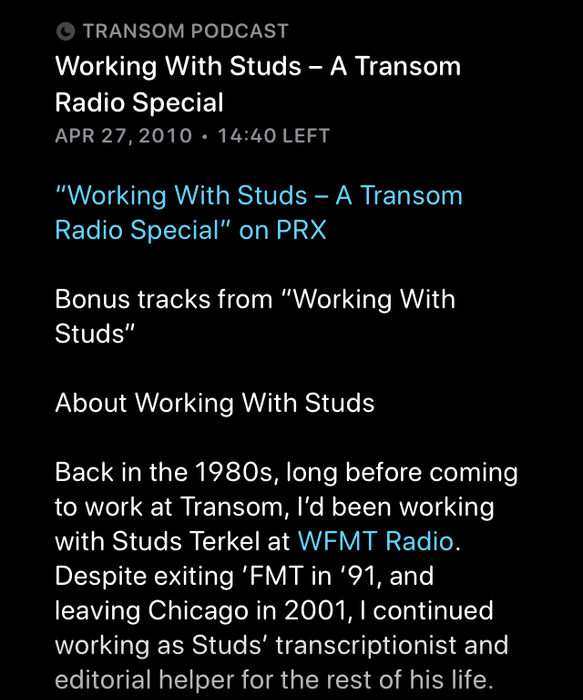
If you’re a podcaster—or even just a fan of aural history—you’ll enjoy this, from PRX.
ɕ
I’m currently in the Introduction from Will Stone’s translation of, Montaigne by Stefan Zweig. Two things:
First, a nit about getting the right ideas into our minds when we read. Not a criticism of authors’ (such as Stone) word choices, but rather of our thinking correctly as readers.
Stone quotes Zweig as, “How to keep humanity intact in the throes of bestiality?” Stone’s translation is from 2015, and our current English usage carries sexual connotations. But I had a hunch that Zweig had something like “in the way of beasts” in mind since he was writing in German, in Brazil, in 1941, amidst the global throes of WWII.
It took me just a few moments to get an LLM to show me that Zweig almost certainly wrote «Bestialität»—which in Zweig’s German would have meant brute savagery or barbaric cruelty with no modern (circa 2025) sexual connotation. And in the larger context of the brutality of the war, that connotation makes perfect sense.
Second, further along Stone quotes a vivid metaphor from Zweig relating to suicidal ideation:
[…] always in moments of impotence it emerged, surging powerfully upwards like a dark rock whenever the tide of passions and hopes in his soul ebbed.
Relax; I’m not suicidal. I’m only remarking on the sublime perfection of that metaphor.
ɕ
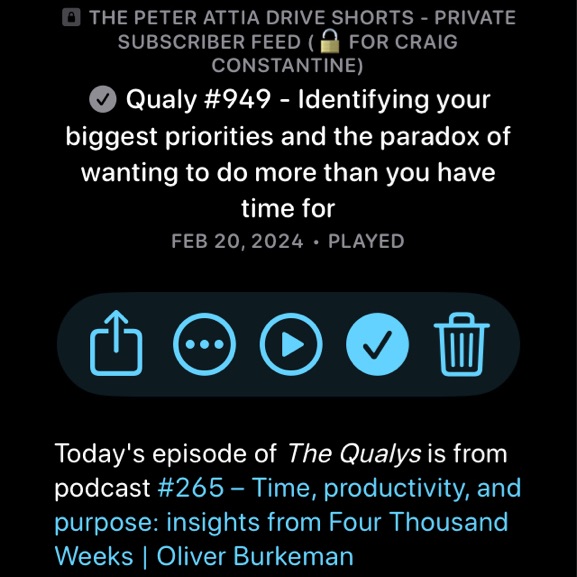
If you’ve not heard of Burkeman’s book (Four Thousand Weeks, I’ve not yet read it) the seed is simple: Your life will be about 4,000 weeks in duration.
In this podcast episode, Burkeman talks about the common advice to prioritize your work and to do the important things first—an echo of Stephen Covey’s metaphor of rocks, pebbles and sand to be put into a jar representing your limited time. Burkeman zooms in on the implication—missed by most people—within Covey’s advice.
You only have finite time. If you have a prioritized list of what’s important to you, it’s the stuff in the middle that will do you in.
Your top 5 items are clearly those big things you should work on. But, your number 6 item—that one feels almost as important as number 5. You need to actively avoid the danger of getting sucked into that number 6 (and the other almost as important items right behind it.)
ɕ
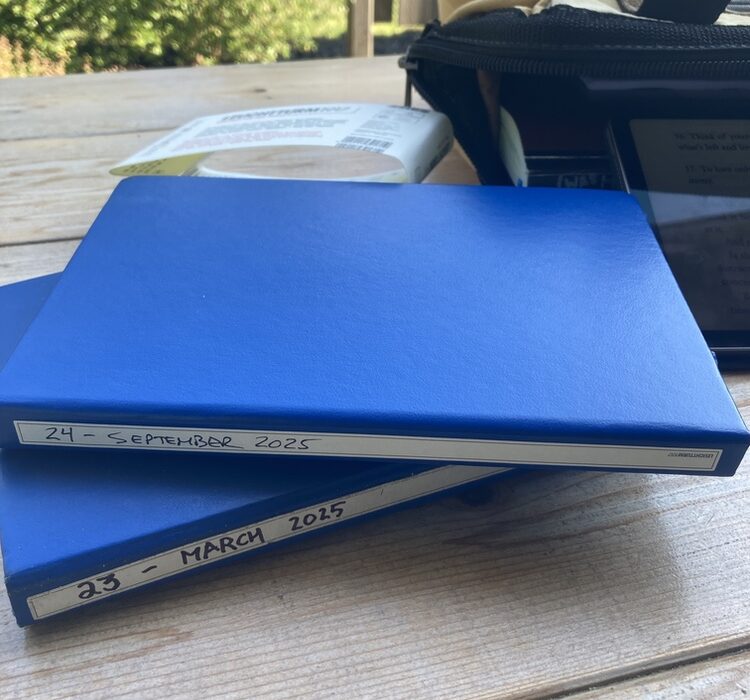
Every 6 months or so I reach the end of another volume in my journaling. At the front of each journal, I write my oath. I use the act of cracking open a new notebook as a prompt to reflect on my journaling process itself.
I reflect on what, and how, I capture things each day. Why am I journaling? Am I seeing longterm trends? Is there any change for better, or for worse?
ɕ
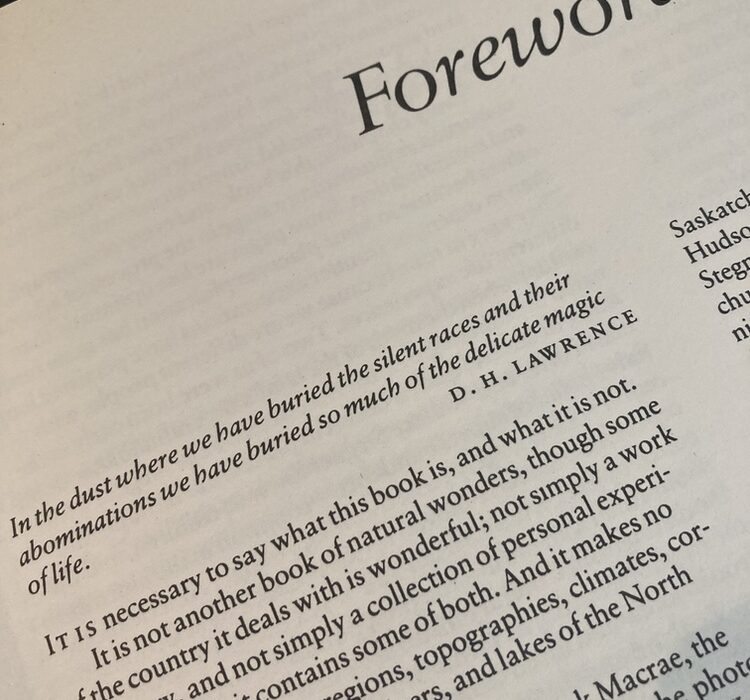
On a recent trip I found myself with some spare time one morning. I used it to slowly wander through the little hotel’s sitting area. There I found a collection of board games and a couple dozen coffee-table books scattered about. I took the time to thumb through each of them for just a few moments.
This book still held my interest after a few moments and so I applied my page 88 test. When I realized that page 88 was somewhere within a long series of color plates—all of which were interesting to me—I flipped to the Foreword. And then I took a photo of the cover so that I could later snag a copy.
Today, here I am with a copy of the book (bought for $4.95 from AbeBooks). Beyond all of the above and the contents of the book itself, the book is now also imbued with the ambiance of that little hotel and cues up all the memories of that little trip.
ɕ
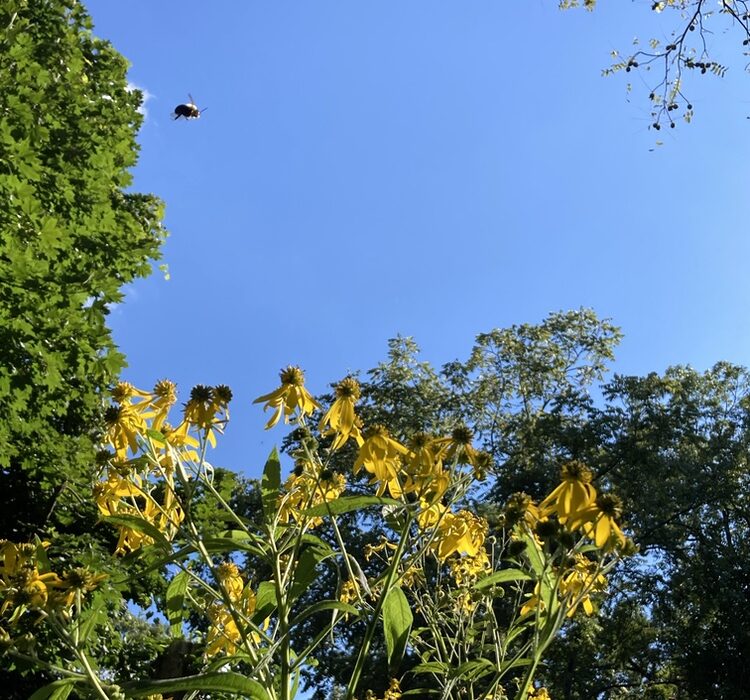
Once in a while I spot striking color compositions—this looked like something van Gogh would paint.
But I didn’t even notice the bumble bee on approach to land until I looked at the photo later.
ɕ
What they couldn’t get right is that leadership isn’t consensus.
Leadership is standing up and saying, “Ladies, I will be in Cartagena on these dates to celebrate our birthday… by myself if I have to. I hope you can make it.”
Nini Nguyen, from What Leaders Can Learn From Type-A Personalities
I’m not a leader in business, but I would like to be a leader in my life generally.
And this is something I screw up all the time. Note to self.
ɕ
New toy: code that spots text files in my slipbox and automatically creates WP posts from them.
slip:4uaaai1.
This is a para with italics and some bold, plus inline code_span() and a linebreak at the end.
Like this second visual line in the same paragraph.
Here’s a link to my site and an autolink https://example.org that should pass as plain text.
Unordered list, with nesting:
Ordered list, with nesting:
Fenced code blocks:
<?php
// sample PHP fenced block
$items = ['alpha', 'beta', 'gamma'];
foreach ($items as $i) {
echo strtoupper($i) . "\n";
}# generic fenced block without language
line 1
line 2my blockquoty goodness
~ john doe
my blockquoty goodness
~ john doe
A multi-paragraph quote to ensure wrapping works across paragraphs.
Second paragraph of the same quote, still quoted and should render inside a single quote block.
~ jane smith
Another paragraph after the quotes.
Those fundamentals matter — and if you’re not doing them yet, they’re worth implementing. But if you’ve already got the basics down and are looking for some lesser-known strategies to enhance your sleep, we’ve got you covered below.
~ Brett McKay from, 45 Tips — That You Haven’t Heard a Million Times Before — to Improve Your Sleep
slip:4uaohe2.
Ironically, I was up at 4am when I read this.
ɕ
What new formats and practices best transmit Art du Déplacement’s culture—beyond technique—so practitioners can reflect, connect, and grow together?
Art du Déplacement’s culture is deepened through «partage», reflective practice formats, and distinctive training like vision work and night missions.
Still, I had the fear, but I knew where I was, where I was going, [and] how— I knew myself better, basically. So this very strong experience with my friends, and this strong experience of failure— That was really an in between moment for me. […]There is before that training session at the «Dame du Lac» experiencing all this. And then there is me discovering more about my inner self and being very different in the way I approach fear.
~ Stany Foucher (1:33:00)
The discussion frames Art du Déplacement as a living culture rather than simply a set of techniques. Stany’s recently published, French-language book is highlighted as a deliberate choice, made with the awareness that language shapes who can engage with the ideas. (Craig and Stany hope that an English translation can eventually be created which captures the subtlety and depth of the material.) The strengths of books—slower pacing and deeper digestion—are compared to the reach and immediacy of video. This leads to exploring audio as a practice medium, with the idea of podcast-led movement sessions modeled on audio yoga classes. The conversation also touches on the value of building shared reference points across the community, so practitioners in different places can connect through common experiences.
Practice design is a recurring theme. The Movers Mindset Pause project is discussed as a way to help practitioners form a cycle from discovery to reflection to change. Coaching is discussed as more than sets and repetitions, incorporating environment, questioning, and reframing experiences. Public-space QM is described as a way to normalize human movement in busy urban settings, reducing self-consciousness and building autonomy. The pair note the importance of training “vision” as a standalone capacity, distinct from fear management or technical skill.
Maybe one thing that I’m trying to focus on sometimes is this vision element of the discipline. Vision is really a topic by itself. If you just try to be in an analyzing mode, you know, trying to analyze the environment and be— not measuring, but just feeling— not for the sake of techniques, but just vision for vision. Maybe new things can arise.
~ Stany Foucher (58:00)
They describe silent, “night missions” where participants select a distant, barely visible endpoint and navigate to it without touching the ground, focusing on presence, creative pathfinding, and trajectory rather than named techniques. Other modalities—lifting, carrying, climbing, and playing on varied terrain—are folded into practice to broaden capacity. Social aspects like shared meals, walks, and storytelling are recognized as essential for transmitting culture, complementing formal training.
But something that I really get, also from those years of training, and maybe you don’t see it is, all the questioning behind it. I cannot think of a training that would not end with a question— [an] open question from—especially from Jann [Hnautra]—just reflecting on what you did. Why were you in that state of mind when we’re doing this movement? Why did you want to stop when you were doing the QM? Lots of questions and reflecting on what you did. I think this is an important piece of the training.
~ Stany Foucher (28:00)
Personal philosophy surfaces through parenting analogies—providing environments where children retain innate movement abilities—and a formative story of a major failure that marked a clear “before and after” in approaching fear. The conversation closes with reflections on building community connection despite geographic distance, testing new formats for sharing practice, and maintaining a loop where ideas, movement, and reflection continually reinforce each other.
Takeaways
Language shapes reach — Choosing French vs. English determines who can read, hear, and benefit.
Books slow the pace — A book supports digestion of concepts that video often rushes past.
Podcast as training — Audio sessions can guide live movement for listeners who learn by hearing.
Build a reflection loop — Journaling and the Pause practice embed discovery to reflection to efficacy.
Coaching beyond technique — The value includes questions, environment, and pointing in the right direction.
Normalize movement in public — Holding QM sessions in busy spaces reduces self-consciousness and increases autonomy.
Train vision explicitly — Treat “vision” as its own topic, not only fear or technique.
Use night missions — Silent, goal-directed traversals cultivate presence and creative pathfinding.
Mix natural modalities — Lifting, carrying, climbing, and terrain play (rocks, slopes) broaden practice.
«Partage» matters — Sharing stories, meals, and walks transmits culture that classes alone can’t.
Parenting reframes coaching — Provide safe environments so kids don’t lose what they already have.
Failure as inflection point — A hard setback created a clear “before/after” in approach to fear.
Resources
https://wiseflow.fr/ — Stany Foucher’s website for his book, podcast, and more.
Art du Déplacement: Au delà de saut — French-language book discussed as framing the culture beyond movement; available as EPUB globally and in print within Europe.
Wise Flow — Stany’s French-language podcast.
craigconstantine.com — Craig’s personal web site with links to everything he does.
Movers Mindset’s Pause — The new Pause publication is a weekly email publication designed for movement professionals—coaches, teachers, gym owners, and practitioners—who want to slow down and reconnect with their deeper why.
Stany Boulifard Mallet: Art du Déplacement, the Yamakasi, and motivation — Stany’s first appearance, back in 2018, on the Movers Mindset podcast.
Art du Déplacement (ADD) — Information about Art du Déplacement in general.
Parkour & Art du déplacement: Lessons in practical wisdom – Leçons de sagesse pratique — Vincent Thibault’s 2015 book discussed in this podcast. The book contains both the French and English text. Don’t confuse it with the similarly named, but completely different book, “Parkour and the Art du déplacement: Strength, Dignity, Community”, published in 2014. There is also a second edition, which is French-language only.
Out on the Wire — Book by Jessica Abel recommended by Craig as a book about podcasting, presented as a graphic-novel-style work interviewing leading creators.
Meditations — Book by Marcus Aurelius (translated by Gregory Hayes) mentioned by Craig as his most-read book.
Quadrupedal Movement (QM) — A practice and movement pattern emphasized in this episode and in Art du Déplacement generally.
Communication with Vincent Thibault — Vincent Thibault’s episode on Movers Mindset.
Move NYC — Public event in New York City mentioned by Craig in reference to normalizing human movement in busy spaces.
Joan of Arc Garden, in Quebec City — Location and statue mentioned by Craig as a setting for personal reflection.
(Written with help from Chat-GPT.)
ɕ
Actually, flow — the state of “effortless effort” — was coined by Goethe, from the German “rausch”, a dizzying sort of ecstasy.
Friedrich Nietzsche and psychologist William James both considered the flow state in depth, but social theorist Mihaly Csikszentmihalyi, author of Creativity: Flow and the Psychology of Discovery and Invention, is the true giant in the field.
~ from, How to Enter a ‘Flow State’ on Command: Peak Performance Mind Hack Explained in 7 Minutes
slip:4uoeho1.
A tidy tour of the history and current status of what we know about flow state.
ɕ
Ira Glass is a champion for the Many Voices that public radio’s mission says it values. This American Life is not the voice of record, but a record of the voices around us. The stories are as fully strange and hopeful and funny and harsh and romantic as America itself…and occasionally all at the same time. They sprawl outside the usual standard-issue broadcast confines, telling about the way it actually was, what it felt like, what really happened. Ira is their shepherd, their piper. But it was not always that way. Ira’s Transom Manifesto, which will appear in serialized form over the course of his time with us, begins with his utter lack of talent at this work. We think Ira’s failures will give you hope. — Jay Allison
~ from Ira Glass – Transom
slip:4utaia1.
This is a sprawling, multi-part piece by Glass. It’s part manifesto and part autobiography. It’s well worth the read. I know my may seem odd—it’s just the opening paragraph that’s written by Allison.
ɕ
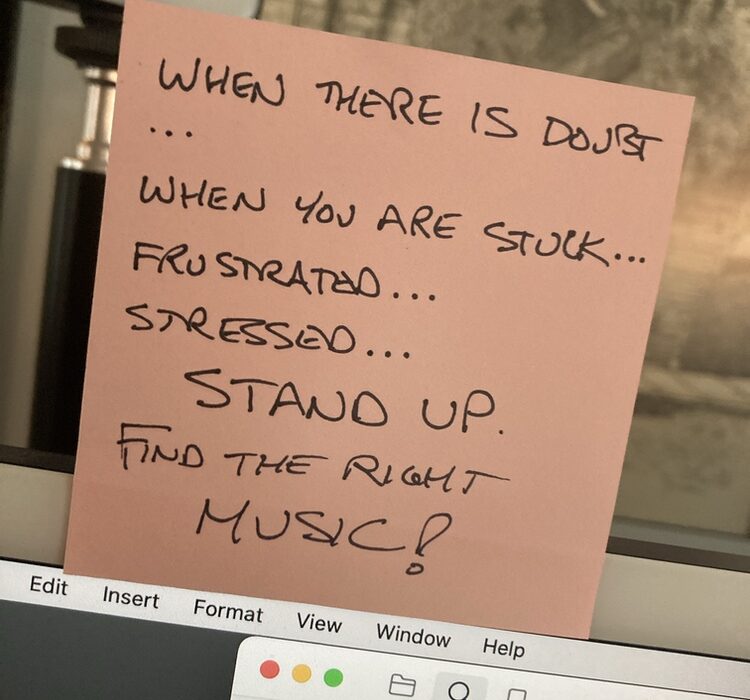
The other day—I forget why—I decided to put on some music, and I just happened to be working standing-up (at my adjustable height desk.) An hour later, having made huge strides on work and on changing my mood, this occurred to me.
ɕ
If you’re regularly having arguments with well-informed people of goodwill, you will probably ‘lose’ half of them–changing your mind based on what you’ve learned. If you’re not changing your mind, it’s likely you’re not actually having an argument (or you’re hanging out with the wrong people.) While it can be fun to change someone else’s position, it’s also a gift to learn enough to change ours.
~ Seth Godin from, How to win an argument with a toddler
slip:4useho4.
It warms my heart whenever anyone describes an argument—what an argument actually is, not rather a fight which too many people refer to as an “argument.”
I’m not the tantrum-throwing child Godin is (among others) referring to— but too often I can be the next child over in the stereotypical classroom: The petulant one. Yikes!
ɕ
These are examples of what we call “friendterpreting.” We use this term to describe the times when a hearing or deaf signer steps into a spontaneous, informal, or conversational interaction to play some sort of language-facilitating role with another hearing or deaf friend, usually a signer as well.
~ Rachel Kolb and Timothy Y. Loh from, How Deaf and Hearing Friends Co-Navigate the World
slip:4usala1.
I remember when seeing someone using ASL was unusual—At first, TV programs that were important, or which really wanted to reach deaf people—that the signer was all I could really see. Now, ASL is so common that it’s just people talking; arguably, it’s even more polite than regular talking which is always audible, versus ASL which is easily out-of-sight. I’ve even considered advocating my wife and I start learning ASL now… partly because eventually one of us will be deaf enough that we’ll need it. But—and I would never have thought of this 40 years ago—it’s also extremely useful for communicating in situations where one cannot be heard.
ɕ
The need for such a contest more than 100 years ago is revealing enough, but the reaction of the judges to the prize-winning plan turned out to be even more so — and it says a lot about why business models for audio production and broadcast remain a struggle.
~ Julia Barton from, In 1924, a magazine ran a contest…
slip:4uniia1.
If one squints slightly, it’s all just the same issue: Things consume resources—radio, TV, podcasts, web sites for blogs, social media platforms—and take people’s time to create. It’s not possible for everyone to listen (read, web surf, etc) to everything for free, because reality is real.
ɕ
Watching a fire, too, fills the eyes and releases the imagination to drift.
~ Matt Webb from, Beach daydreams, lost at sea
slip:4uieho7.
For a few years now we’ve had a standing date for camping near a beach at the end of summer. This little collection from Webb touches on some of the why.
ɕ
If it’s used in the right way, I love it, of course! I mean, I used to joke that the goal of a filmmaker is to be Fellini-esque, you know, when your name means something in that way? We often say something was a very Fellini-esque experience. So if you say a film is Cronenbergian… I like that. The thing that does bother me a little bit is “body horror,” because I never use that term! It was a young journalist who invented that term and it stuck, it’s out of my hands. But I would never have thought that what I did was body horror.
~ Patrick Heidmann from, David Cronenberg – The Talks
slip:4uteie54.
I recently managed to get caught up on The Hansel and Gretel Code, a podcast from my friend Curtis Cates. (I started years behind, so that I had 42 hour+ episodes to listen to.) It was so worth it. First off, great podcast on a very interesting to me topic. Also, I learned about the concept of metalepsis.
Reading the Wikipedia page doesn’t really do it justice. But listening to Curtis talk about metalepsis, and in particular unpacking all the context around some innocent seeming word or phrase really made it clear. For example, in certain centuries and in certain circles of well read people, “planing the planks of our coffins” isn’t just an interesting phrase… for those certain people it brought to mind a whole other complex social and political issue complete with its own colorful players.
ɕ
Around the U.S., about 90,000 tons of nuclear waste is stored at over 100 sites in 39 states, in a range of different structures and containers.
~ Gerald Frankel from, How and where is nuclear waste stored in the US?
slip:4uteho4.
This is probably silly, but I’ve always imagined that one day we’d master nuclear fusion. (Fission is “splitting” versus fusion which is “combining.” Our currently nuclear generation is a very complex chain reaction of the fission variety.) To run a fusion reactor requires—literally—the temperatures inside the sun. I’d always hoped we’d be able to dump (teeny tiny amounts) of our current nuclear waste into our fusion reactors… we’re everything is stripped apart to protons and electrons. The perfect waste disposal system. ¯\_(ツ)_/¯
ɕ
And then the light of an older heaven was in my eyes
~ Doug Muir from, Occasional paper: The Light of an Older Heaven
and when my vision cleared, I saw Titans.
— Alan Moore
slip:4ucooa2.
A wonderful quote to open a wonder-filled article.
ɕ